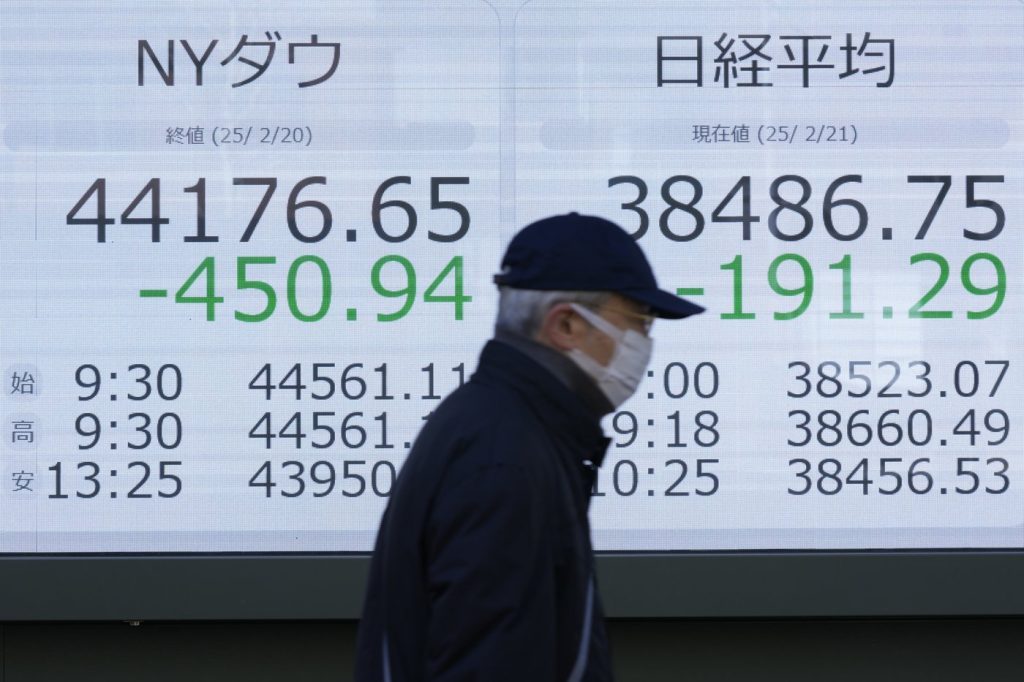TOKYO (AP) – Asian shares showed mixed results on Friday, following a significant drop in Walmart's stock that pulled Wall Street away from its recent record highs. The benchmark Nikkei 225 in Japan saw a marginal increase of 0.1%, reaching 38,719.34 by the morning session.
Investors closely monitored currency fluctuations, given that a weak yen benefits many export-reliant manufacturers in Japan. In currency trading, the U.S. dollar climbed to 150.42 Japanese yen, up from 149.53 yen. Meanwhile, the euro remained stable at around $1.0502, having changed little from $1.0500.
The Japanese government reported a year-on-year increase of 3.2% in the nationwide core consumer price index for January, which excludes volatile fresh food prices. This inflation rate is crucial for the Bank of Japan, as it continues to hover at or above the central bank's target of 2%. The Bank of Japan raised its key policy rate from 0.25% to 0.5% last month.
Australia's S&P/ASX 200 dipped 0.3% to 8,300.90, while South Korea's Kospi fell by 0.2% to 2,650.17. However, Hong Kong's Hang Seng index surged by 2.7%, closing at 23,183.02, largely fueled by a robust performance from Alibaba Group. The Chinese e-commerce giant reported its fastest revenue growth in over a year, following strong financial results that exceeded analyst expectations.
Alibaba's net profit soared to 48.9 billion yuan, or approximately $6.71 billion, as disclosed in the report from Thursday. The company's stock, traded in New York, jumped 8.1% as CEO Eddie Wu announced plans for aggressive investments in artificial intelligence and cloud computing infrastructure.
The Shanghai Composite index also experienced a positive uptick, gaining 0.6% to reach 3,369.26. In contrast, on Wall Street, the S&P 500 experienced a drop of 0.4%, marking its first decline after achieving all-time highs in the previous two days. The Dow Jones Industrial Average fell by 450 points, or 1%, while the Nasdaq composite decreased by 0.5%.
The downturn on Wall Street was primarily driven by Walmart’s stock, which plummeted by 6.5%. Despite the retailer reporting stronger-than-expected profits for the latest quarter, its profit forecast failed to meet analyst predictions. The increased economic pressures from high inflation and proposed tariffs by U.S. President Donald Trump contributed to investor anxiety.
Walmart remains optimistic about revenue growth for the upcoming year and expressed confidence in managing tariff effects; however, its profit outlook negatively impacted other retail stocks. Shares of Costco fell by 2.6%, Target dropped by 2%, and Amazon lost 1.7%.
In contrast, Shake Shack's stock rose 11.1% after reporting stronger-than-anticipated profits. CEO Rob Lynch indicated that sales trends remained solid despite challenges such as adverse weather and ongoing wildfires in the Los Angeles area that deterred some customers.
Overall, the S&P 500 closed down by 26.63 points, ending at 6,117.52. The Dow Jones Industrial Average dropped 450.94 points to conclude at 44,176.65, and the Nasdaq composite fell by 93.89 points to 19,962.36.
In the bond market, Treasury yields edged lower after reports indicated more U.S. workers applied for unemployment benefits last week than anticipated by economists. Despite this uptick in unemployment applications, the overall figure remains relatively low historically. Such developments are expected to influence the Federal Reserve's stance on interest rate adjustments.
Last month, the Fed opted not to decrease its main interest rate, marking the first time it refrained from such action since it began last September. During their recent meeting, Fed officials also discussed potential economic impacts stemming from Trump’s proposed tariffs and strong consumer spending, which could exert upward pressure on inflation in the current year.
The yield on the 10-year Treasury note dipped to 4.50%, down from 4.54%, while the two-year Treasury yield remained steady at 4.27%. Commentary from UBS Global Wealth Management’s chief investment officer for the Americas suggested that the Trump administration may be cautious regarding broad and sustained tariffs to avoid jeopardizing U.S. economic growth or exacerbating inflation.
In terms of energy trading, benchmark U.S. crude oil prices increased by 32 cents, reaching $72.57 a barrel, while Brent crude, the international standard, slightly decreased by 4 cents to $76.44 a barrel.










